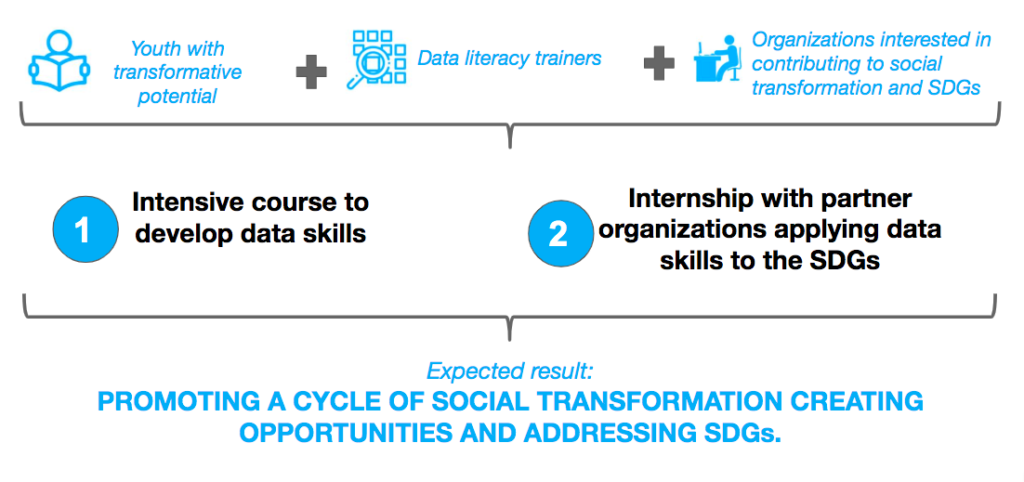EmpoderaData


New data and technologies are challenging and shaping our individual and collective capacities to learn, communicate, and make decisions. In the data revolution era the hope is for data and analytics to allow policymakers, businesses, civil society organizations, and citizens to make better, more evidence-informed decisions.
This requires improving digital inclusion, advocating for open data and civic technology, but crucially developing data literacy skills. To tackle the shortage of data literacy skills across sectors (i.e. academia, civil society, public and private sectors), DPA and the University of Manchester are piloting a joint program in Brazil, Colombia and Mexico.
What is data literacy?
Data literacy is the ability to understand, analyze, and constructively engage in society through or about data. In order to leverage data (i.e. official statistics, big data, open data etc.) to achieve social goals, this means:
- Developing core technical skills, such as traditional quantitative analytics, data science, artificial intelligence methods;
- Learning to use data by exercising due diligence, and in a responsible and fair way. This includes ensuring that the rights of people represented in the data are respected by taking into account ethical and legal considerations, such as data governance, data protection and privacy, representativeness and participation.
To learn more about
data literacy:
About EmpoderaData
EmpoderaData, from the Spanish word empoderar for “to empower”, builds upon the success of the Q-Step program. Q-Step, for “Quantitative Step”, was developed as a strategic response to the shortage of quantitatively-skilled social science graduates in the United Kingdom. University of Manchester (UoM) is one of 15 centers taking part in a £19.5 million program designed to promote a step-change in quantitative social science training.
Together, University of Manchester and Data-Pop Alliance will expand upon the program’s excellent results, exploring this model in the Global South as the “EmpoderaData Project”. The project aims to promote a virtuous cycle of social transformation by fostering data literacy skills applied to addressing our society’s most pressing issues in the framework of the Sustainable Development Goals (SDGs).

Pilot Phase
January - October 2019
During this period, DPA and UoM are carrying out a scoping study and seeking to consolidate a network of collaborators for the implementation of the program in Brazil, Mexico, and Colombia. As a part of this study, we are conducting research about the state of data literacy in the Latin American context and exploring the applicability of a ‘SDG fellowship’ model.
Timeline:
16-17 May 2019, São Paulo
“Data Literacy and SDGs” held working group at FGV EAESP, gathering representatives (Brazil, Mexico, Colombia) from academia, civil society, private and public sectors
May - September 2019
Research about the state of data literacy in Brazil, Mexico and Colombia and the SDGs.
Find the results in the report "EmpoderaData: Data literacy assessment and Sustainable Development Goals data gaps - Brazil, Colombia and Mexico".
16 October 2019, Manchester
Presentation of proposal for piloting a data literacy skills program and/or SDGs Fellowship in Brazil, Mexico and Colombia at University of Manchester
Contact us
For more information, please write to:
